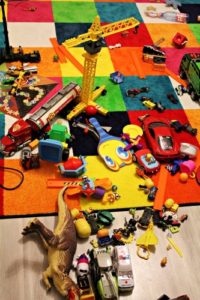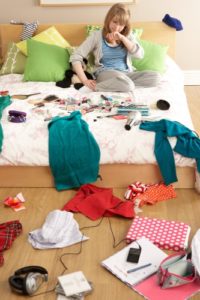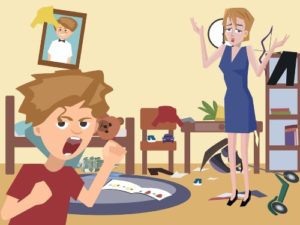Kids and Teens: Why Can’t They See Clutter?

Teens and kids do not perceive clutter in the same way that adults do.
I was visiting my oldest and dearest friends, who have two grade-school aged kids. As bedtime drew near, I sensed a weariness in my friends, as the battle to put away belongings that had been strewn about the house ensued. It was obvious that this struggle was a regular occurrence, and it took a substantial amount of what remained of the day’s energy. “It’s as if we are the only ones that can see the mess,” my friend said tiredly. "I wonder what it will be like when they are teens."
If the battle to curb your kids’ clutter is sapping your energy and putting your nerves on edge, then this post is for you.
Decluttering with Compassion
I have been greatly inspired by Lauren Rosenfeld and Dr. Melva Green’s book, Breathing Room: Open Your Heart By Decluttering Your Home. (You might recall Dr. Green – she was on the show, Hoarders.) What makes this book different from so many books on decluttering (and there’s a TON of them out there) is their unique viewpoint of decluttering from a spiritual perspective. Their writing is sensitive to the emotional climate around clearing our clutter, and at every step encourages self-compassion. It’s a highly recommended read.
One section of the book totally rewired my thinking about clutter where kids and teens are concerned. It completely echoed my friend’s remark about the kids not noticing the clutter:
“Children do not see clutter. It does not register with them. If you point it out to them, they simply cannot see the problem with it – even if you explain. Your children do not understand your need for order and simplicity, which may give you the idea that they are openly defying you. They’re not. So, if you find yourself in a constant power struggle with your child because you believe that the way she keeps her room is an open act of rebellion and disrespect – and you are taking that as a personal affront, or see it as a disregard for everything you have sacrificed to make her happy – you can stop now. Seriously. Stop.” [pg.80-81]
My Story
 My bedroom was a constant source of friction between me and my mother. It was a veritable shithole. Clothes on the floor, junk everywhere, mess crammed under the bed, nothing put away properly. There were threats of trash bags being brought in and all of the stuff that was on the floor being thrown away. I honestly did not see the clutter, and there were a lot of fights about my room.
My bedroom was a constant source of friction between me and my mother. It was a veritable shithole. Clothes on the floor, junk everywhere, mess crammed under the bed, nothing put away properly. There were threats of trash bags being brought in and all of the stuff that was on the floor being thrown away. I honestly did not see the clutter, and there were a lot of fights about my room.
If you are the parent of a messy child or teen, I hope that this story comes as a comfort to you. I turned out to be the kind of person who loves order enough to want to help other people to find it in their lives. As an adult, physical clutter mirrors and magnifies my internal clutter. Consequently, it makes me feel like I am less capable of managing the complex internal healing processes that are so vital for my wellness and growth. Hence, when I am able to create order in my physical surroundings, I am better equipped to be calm and centered as I face the internal clutter that must be cleared.
Internal Clutter vs. External Clutter
But this is not the case for our young people. They are blossoming into their own full consciousness – trying on hats and labels to see what fits their budding sense of identity. These hats and labels are alternatively embraced and cast aside as choices are made at the moment whether something suits them or not. The internal messiness of this process far overshadows any clutter in their physical environment, so they simply don’t see the clutter. They are on to the next experience, casting off the clothes, project supplies, playthings and books that no longer suit them.
It is the nature of the child and teen to be self-absorbed. While you may desperately want your young person to understand how upsetting clutter is to you, it’s just not in their nature to grasp this organically. However, it IS possible to gradually develop their sense of empathy and understanding around the issue, but it may be years before they are ready to embrace tidiness as their own.
Getting Clear About Goals with Kids
One method Lauren and Dr. Green suggest to manage clutter in the bedrooms of kids and teens is to help them to be clear about their goals. (It is important to acknowledge that this process will be ongoing and shifting as the child grows and changes.) When asking kids what they want to be when they grow up, it can become a shared goal to help the young person to craft their bedroom in line with those goals.
Does your young person dream of being an astronaut? Make sure that there is a clutter-free space where a telescope can be placed for observing the stars. If he dreams of being a fashion designer, create a clear and attractive space for him to draw and create. Next, place paper and inspiring resources close at hand. Ask your young person to make a special pile of items that support their dreams and be certain to display them prominently. Help your young person to eliminate things that take up space that encroaches on their dreams and goals. Give them choices about the disposition of items that no longer align with their goals. Finally, offer them the support to have a yard sale or suggest a younger cousin that might like the old toys.
Ask the Right Questions
Dr. Green is clear that the wrong question to ask our kids during this process is, “Are you attached to this?” The answer will always be a resounding YES. Instead, she suggests the more goal-connected question of, “How does this serve who you are and who you are choosing to become?” This question empowers the young person and respects the choices that they are making in their lives. Additionally, it also makes it clear that you are supporting these choices and want to help them to achieve it. Right there, you go from being the enemy to becoming an ally.
The toys of childhood days past have their place as well. Let your young person decide which are the most precious and important of these memorable items. Make a special corner for them. Our young people seem to be in a rush to grow up quickly. Usually, they are relieved to know that it is OK to hold onto their childhood a little longer. Create a shrine to younger days and let them choose their favorite keepsakes for this spot.
Sweeten the Pot and Show the Way
Don’t forget to create some sort of reward for this project. Offer a special outing or a sleep-over in the newly cleared space. Make the reward an experience rather than a physical thing that will contribute to clutter.
Keep in mind that the best way to teach a child anything is to first model the behavior ourselves. Let your kids see you struggling with the decisions of decluttering. Talk through your internal process out loud. Ask them what they would do if they were in your place. After they get used to seeing your shift in values, they will be far more willing to undertake the process themselves.
Examine Your Motivations
 Once things get rolling, you may find that you are more resistant to let go of your kids’ things than they are. We may be feeling a great deal of nostalgia for the past. It may be hard for us to let go of hopes and dreams we have projected onto our young people. If we want to be truly supportive of them becoming self-sufficient manifestors of their own dreams, we have to be ready to release that chemistry set that they never enjoyed (but you loved as a kid).
Once things get rolling, you may find that you are more resistant to let go of your kids’ things than they are. We may be feeling a great deal of nostalgia for the past. It may be hard for us to let go of hopes and dreams we have projected onto our young people. If we want to be truly supportive of them becoming self-sufficient manifestors of their own dreams, we have to be ready to release that chemistry set that they never enjoyed (but you loved as a kid).
Finally, a word about cleaning and punishment. Many of my clients have told me that they feel paralyzed around cleaning because it has so many negative associations with childhood punishments. This is very difficult to overcome as an adult. Please do not use cleaning as punishment. It is ok to reward cleaning with allowance or privileges. Don’t set up a negative dynamic around cleaning or decluttering. Keep it positive and your kids will eventually transition into organized, neat young adults.

Clear your Space - Recharge your Self - Direct your Life
As an Amazon Affiliate, I earn from qualifying purchases.
Latest posts by Christina Laberge (see all)
- Scent and Creating Sacred Space at Home - November 28, 2018
- Sacred Sound – Enhance Your Home - November 21, 2018
- Moving Cross-Country with Less Stress - October 4, 2018
